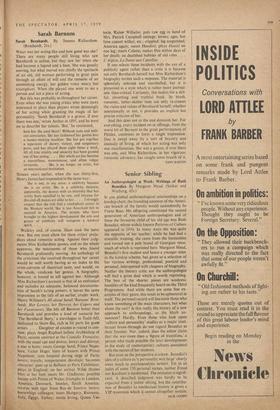Senior Sibling
IF you plotted anthropological relationships on a kinship chart, the founding ancestor of the Ameri- can branch of the family would undoubtedly be Franz Boas. His offspring constituted the second generation of American anthropologists and of these the favourite child of his old age was Ruth Benedict, whose widely known Patterns of Culture appeared in .1934. In many ways she was quite the opposite of her teacher; while he had had a scientific training, she came from the humanities and turned out a pale brand of Georgian verse, much of which is reprinted here. Margaret Mead, Benedict's first student and hence a younger sister in the kinship scheme, has given us a selection of her various writings, professional, poetical and personal, interspersed with chapters of biography. Neither the literary critic nor the anthropologist will find a great deal which is worth reprinting. The best of the shorter pieces are academic homilies of the kind frequently heard on the Third Programme. And while there are some fine ex- amples of their genre, this tends to be ephemeral in itself, The personal record will fascinate those who know something of the main characters, but what about the rest? Is this really the history of a new approach to anthropology, as the blurb an- nounces? Hardly. Even those who look upon 'culture and personality' studies as a major intel- lectual break-through.do not regard Benedict as their founder. Nor, indeed, does the editor claim that she was more than a 'figure of transition,' a person who made possible the later developments in the study of contemporary cultures associated with the names of her students.
But even so the perspective is askew. Benedict's idea of a culture as 'a personality writ large' clearly owes much to psychoanalytic writers. Yet in an index of some 150 personal names, neither Freud nor Kardiner is mentioned. The omission is signifi- cant, A detached judgment was hardly to be expected from a junior sibling, but the contribu- tion of Benedict to intellectual history is given a VIP treatment which it, cannot altogether sustain.
JACK GOODY


































 Previous page
Previous page